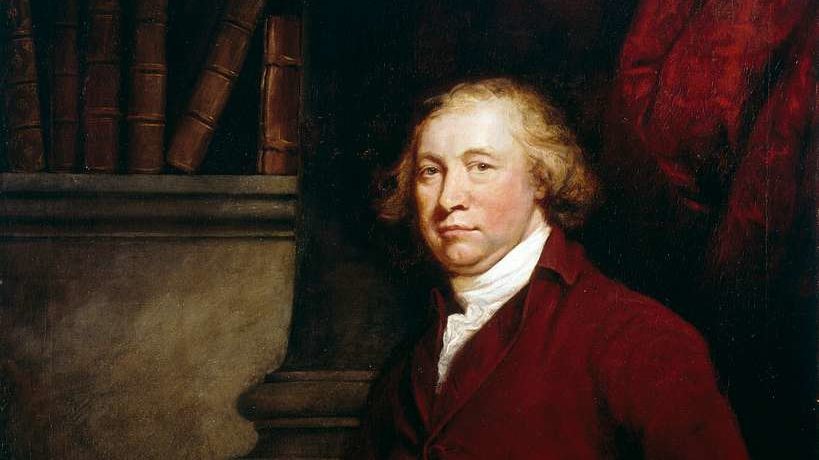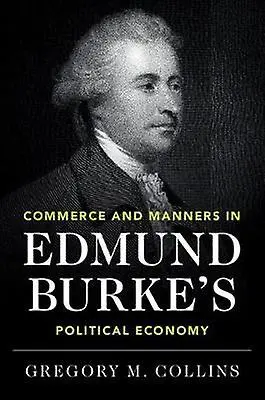Edmund Burke famously wrote in his Letters On A Regicide Peace that, “Manners are of more importance than laws.” In Commerce and Manners in Edmund Burke’s Political Economy, Professor Gregory Collins delves into what Burke means in this statement, and explores the role manners play in economics, politics, and human society.
Specifically, Collins sets out to “illuminate Burke’s theoretical observations on the interaction between commerce and morals and locate them in wider intellectual contexts.” This book is thoroughly researched and offers well-woven ideas, insights, and new interpretations that run counter to some other scholarly viewpoints on Burke.
That said, this work is not for the neophyte Burke enthusiast, but for the serious Burke-a-phile with significant prior knowledge of Burke. Commerce and Manners is an extremely sophisticated take on Burke’s political economy. The book is over 500 pages long, and includes meticulously detailed recountings and analyses of Burke’s economic and political affairs from the 1700s. This book is therefore best suited for a more academically inclined audience, specifically those with a keen interest in history, political science, economics, or the way these fields intersect.
One specific area Collins covers more so than any other is the influence and content of Burke’s only exclusive economic writing, Thoughts & Details on Scarcity. For Collins, Burke’s interpretation of economic thought is predicated on Burke’s beliefs that “the promotion of free commerce was rooted in a sense of justice.” This sense of justice is predicated, in turn, on a conception of natural law; Collins writes, “Burke is presenting a form of natural rights reasoning: the individual has at least some right to produce, and he has a right to consume the rewards of his toil.” Not only that, says Collins, but
The right to labor, Burke suggests, stems from God’s granting of the gift of nature for all of us to use. Such comments imply a firm, if rudimentary, notion of natural rights . . . a hint that the authority of natural rights derived from the will of God (emphasis added).
This is not the only passage Collins uses to illustrate Burke’s deep-seated natural rights sentiment and to make his argument that Burke’s thought was animated by his belief in God. He furthers this notion here: “Burke in Third Letter underscores a brute fact of man’s fallen state: he must labour to eat.” Collins quotes Burke at length, then summarises the meaning found in Burke’s poetic words by saying:
oil is necessary for the production and consumption of provisions. To deny this reality would signal a gross ignorance of man’s inherent constraints and imperfections . . . and occasion far greater consequences than the burden of labouring to eat.
Government-imposed restrictions, mandates, and machinations cannot mitigate the need to labour; instead, they only make things worse. Therefore, Collins argues that Burke believes in the government interjecting as little as possible towards creating the good, and instead should focus solely on creating the conditions for prosperity. Collins summarizes Burke’s beliefs as, “Government held the responsibility to establish the conditions under which men and women would be rewarded for their toil.” In establishing these conditions, the government should not overextend its reach and burden people with laws, regulations, and micromanagement. According to Collins’ interpretation of Burke’s thought, the government should govern with “a steadiness of hand and force of execution—but it should not overwhelm the people with a torrent of rules.” Collins summarizes Burke’s warning:
State officials who attempt to regulate the habits and customs of different communities are destined to meet failure . . . because remote legislators and magistrates do not possess the necessary level of information about particular social and economic circumstances required to effectively govern those communities.
These local customs and habits are what Collins describes as the “unwritten constitution,” which is “the patchwork of a culture’s norms, customs, and traditions that antedate legal regulations of human conduct.”
Collins astutely grasps Burke’s conviction that these unwritten and informal—but nonetheless very real—habits, customs, and culture are sewn into the fabric of the places and countries where people conduct trade. This is why “trading activity was intricately woven into the habits of culture. The serious study of commerce illuminated deeper truths about the character of a people and the constitution of human nature.” In other words, manners and trade are inseparable.
When it comes to the actual practice of trading, it is precisely the development of manners that made trade possible. Towards the end of the book, Collins explains that “the rise in trade produced civilizing effects on mankind. Two parties with mutual material interests will be more likely to satisfy their desires through transactional exchange than through war, thereby leading to greater prospects for international peace.” Collins concludes this thought by saying, “In short, commerce gave rise to a new form of ethical behaviour that served as the enlightened foundation for virtue and morality in modern Western civilization.”
From this, Collins goes on to assert that according to Burke, “The development of trade and manufacturing was the product of a wider moral and cultural environment in which the softening influence of such manners provided the ethical substructure for the emergence of mass commerce.” In other words, trade and manners go hand in hand; the more civil we are towards each other, the better our economies function. This is also why it is important to understand the role of manners in Burke’s economic thought. This is precisely why, according to Collins,
manners also created economic order by setting the necessary preconditions for exchange economies to progress steadily within the broader growth of civilization. Commercial dynamism was threaded carefully into existing moral, cultural, and religious institutions that had governed Europe throughout the centuries.
Manners, order, and stability were all interwoven in the growth of economies, interpersonal, and international relations.
This morality generated from manners and civility created a sense of order and stability. This is what made the concept of private property so important for Burke, according to Collins. As Collins explains, “by supplying the virtue of stability, private property becomes the backbone of an enduring political order. Stewardship of land tames man’s basest passions and elevates his capacity for moral and temperate action.” Landed property never moves; that makes it stable. The families that tend to and manage a hereditary piece of real estate therefore possess the “rights of families throughout the ages,” who “generate a principle of constancy amid the fluid shifts and notions of mundane human activities.” This idea further substantiates the link between commerce, manners, and politics.
To Burke, there is no difference between politics, economics, and human nature; they are one in the same. In this massive study, Collins is able to smoothly blend Burke’s economic thought with his thoughts on politics and human nature. Though the book is not light reading, I would highly recommend it to a serious Burke scholar who has the time and diligence.







